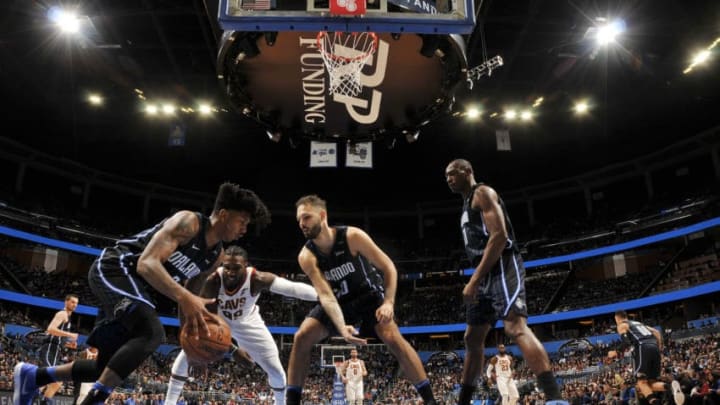Despite a commendable fourth-quarter comeback effort, communication and execution errors once again doomed the Orlando Magic as they fell to the Cleveland Cavaliers 131-127.
The Orlando Magic have actually been pretty good in first quarters this season. They had a positive net rating in first periods heading into Saturday night’s game. After 12 minutes against LeBron James and company they only trailed by one, which is no small feat for this injury-ravaged, lottery-bound squad.
But the game eventually got away.
Even after a late rally that cut the lead to three points, the Magic’s mistakes came back to bite them again. Orlando Magic could not make that final stop in a 131-127 loss to the Cleveland Cavaliers at Amway Center on Saturday.
In the third quarter, the Magic were outscored 40-23. The team’s assist-to-turnover ratio progressively soured as the defense hemorrhaged points and the offense failed to execute. Turnovers are particularly costly against a team with James on the court, which the Magic learned quickly as he overpowered smaller defenders in transition and pulled up from three when the defense sagged.
There is no clear solution to defending James. Mario Hezonja was tasked with the assignment, which went about as you would expect despite his best efforts. There is only so much you can do about that freight train coming down the lane, especially with this team’s limited personnel.
All you can really do is hope you make enough shots and avoid turnovers enough to prevent him from living in the open court. That requires airtight offensive execution. And that was sorely lacking for the Magic.
In theory, this team is supposed to play with pace, and it is evident in how frequently the team tries to engage in double drag, 21 or early ball screen action. Those are all plays first popularized by Mike D’Antoni’s Seven Seconds or Less Phoenix Suns commonly referred to as early offense or secondary breaks and used to generate more efficient shots in transition if an opportunity or advantage is not immediately available.
These types of actions are extremely effective for countless NBA teams, namely D’Antoni’s Houston Rockets, but the Orlando Magic’s half-hearted, almost listless execution turns them into jumbled messes in which two or three players will aimlessly coagulate until one shoots a pull-up jumper. That happened countless times during Saturday’s game.
The Magic run these sets, and all their sets, with purpose more frequently early in games. The communication breakdowns and poor execution gradually become more frequent, leading to bad shots, turnovers and transition opportunities for opponents. In the first quarter against the Cavaliers, bigs set better screens, players looked like they knew where they were supposed to be and shooters received and took better shots.
But as the game progressed, the offense devolved into more isolation, pull-up jumpers and well, worse shots and desperate, purposeless passes. That leads to turnovers, fastbreak opportunities and Lebron James in the open court.
This team often has similar issues with communication and execution on the defensive end, but those were less prevalent against the Cavaliers. Yes, they gave up 131 points, but it is hard to be mad at the likes of Wesley Iwundu, Arron Afflalo and Bismack Biyombo, all of whom continually hold up their end of the defensive bargain.
Saturday night and all season long, those three have generally executed the scheme well. Arron Afflalo’s footwork and diligence trailing Kyle Korver running around screens were admirable. Wesley Iwundu is still young and makes mistakes. But he is a bona fide pest getting his hands into the opposing offense and blowing up handoffs.
Bismack Biyombo is the only rotation big able to defend at the level of ball screens, which has intrinsic value against a team like the Cavaliers with a shooting center and point guard.
The defensive issues start at the point of attack, where Isaiah Thomas used Kevin Love and Tristan Thompson screens to make Elfrid Payton’s assignment impossibly difficult. Thomas finished with 19, shooting 7 of 13 from the field. But he could have easily had more as he missed several wide open attempts he normally would make.
In Elfrid Payton’s defense, the Love-Thomas pick-and-roll combination is a very difficult cover.
This exact sequence happened Saturday and will likely be a Cavaliers staple going forward: Thomas beats the opposing point guard with a screen, Love pops to the 3-point line, the defensive big man is forced out of traditional drop or ice coverage to guard Love and Thomas either gets a wide-open driving lane or forces help defense and hits a corner shooter.
The alternatives are switching, where the Cavaliers will be more than happy to exploit the resulting mismatches, or hedging, which demands a defensive big man with mobility well above the position’s average. Neither are particularly viable for the Magic.
The point is, the Cavaliers have personnel that is extremely difficult for most teams, especially the Magic, to deal with. That is why they are favorites to repeat as Eastern Conference Champions. But if the Magic wanted a chance to win, the offensive execution needed to be more purposeful and consistent. It has not been either of those things for much of this season, and Saturday was no different.
The Orlando Magic now hit the road for the next three games, starting in Dallas against the Dallas Mavericks.
